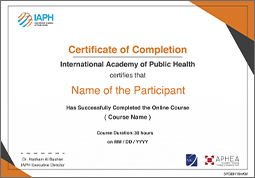Research in Mental Health
Description
This course provides the trainees with knowledge and practical skills in core epidemiological principles and methods central to mental health research, as well as the appropriate statistical methods for data analysis and the application of social research methods, including the capacity to choose the most appropriate methods to investigate particular research questions, to critically review social research, and to apply research.
The course emphasizes on the social dimensions of health, illness, and injury and reviews descriptive and analytic epidemiology for major mental disorders of childhood, adulthood, and late adult life. The course also examines issues of classification of psychiatric disorders as well as operational case definitions and the measurement techniques to enhance field surveys and risk factor research. Moreover, this course introduces students to qualitative research and helps them understand how qualitative research supplements quantitative inquiry in human behavior and the social sciences.
Learning Outcomes
- Describe core epidemiological and statistical concepts central to mental health research
- Describe the main concepts of social epidemiology including deprivation and socio-economic status, and their uses and limitations in mental health research
- Design, conduct, and interpret quantitative mental health research studies
- Describe major types of qualitative design used in mental health research and to draft interview guides for qualitative interview studies
- Apply appropriate univariate and multivariate analyses of continuous and categorical data, including linear and logistic regression
- Compare a variety of approaches to analyzing qualitative data
- Evaluate the psychometric properties of mental health instruments
- Compare various research methodologies in the field of mental health
- Evaluate theory, methods and results of research from a wide range of disciplines in the field of mental health
- Weigh ethics principles and research governance structures and processes relevant to the field of mental
- Concepts in Social Epidemiology.
- Measurement Instruments in Mental Health and Psychometric Properties.
- Major Study Designs in Psychiatric and Mental Health Epidemiology.
- Qualitative Research Design.
- Methods of Collecting and Analyzing Empirical Materials.
- Univariate Statistical Analysis.
- Multivariate Analysis.
- Introduction to Principal Components and Factor Analysis.
- Ethical Standards for Mental Health and Psychosocial Support.


Certificate
